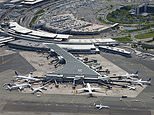Flights at several major airports across the United States, from New York to Dallas, were grounded on Tuesday afternoon, causing widespread disruption in air travel across the nation. The Federal Aviation Administration (FAA) confirmed the grounding, citing a technical issue that affected flight operations.
The sudden halt in flights has left thousands of passengers stranded at airports, with many expressing frustration over the lack of information and the uncertainty of their travel plans. Major hubs such as John F. Kennedy International Airport, LaGuardia Airport, and Dallas/Fort Worth International Airport were among those impacted.
Technical Glitch Sparks Nationwide Delays
The FAA reported that a technical malfunction in its air traffic control system was responsible for the grounding of flights. The system, which is crucial for managing the complex web of air traffic across the country, experienced an unexpected failure, prompting the agency to take precautionary measures.
According to the FAA, technicians are working diligently to resolve the issue and restore normal operations. “We understand the inconvenience this has caused and are committed to ensuring the safety and efficiency of air travel,” an FAA spokesperson stated.
Impact on Airlines and Passengers
Major airlines, including American Airlines, Delta Air Lines, and Southwest Airlines, have been forced to cancel or delay hundreds of flights. Passengers have been advised to check with their respective airlines for updates on their flight status.
At John F. Kennedy International Airport, long lines of passengers could be seen waiting for updates, while at Dallas/Fort Worth International Airport, travelers expressed their frustration at the lack of clear communication. “It’s chaos here,” said one passenger. “We’ve been waiting for hours with no idea when we’ll be able to fly out.”
Airlines Respond to the Crisis
In response to the disruption, several airlines have issued travel waivers, allowing passengers to rebook their flights without additional fees. American Airlines, in a statement, assured customers that they are working closely with the FAA to minimize the impact on travelers. Delta Air Lines echoed this sentiment, emphasizing their commitment to passenger safety and convenience.
By the Numbers: Over 1,000 flights have been affected nationwide, with delays averaging more than three hours.
Historical Parallels and Expert Insights
This incident is reminiscent of past disruptions caused by technical failures in air traffic control systems. In 2015, a similar glitch led to the grounding of flights across the Eastern United States, highlighting the vulnerabilities in the nation’s air traffic infrastructure.
Experts in aviation technology have pointed out that while the FAA has made significant strides in modernizing its systems, challenges remain. “The complexity of the air traffic control system means that even minor issues can have a cascading effect,” said aviation analyst John Smith. “It’s crucial for the FAA to continue investing in robust and resilient systems.”
Looking Ahead: Preventing Future Disruptions
In the wake of this incident, there are calls for a comprehensive review of the FAA’s technical infrastructure to prevent future occurrences. Lawmakers have also expressed concern, urging the agency to provide a detailed report on the cause of the glitch and the measures being taken to address it.
The Transportation Security Administration (TSA) has been coordinating with the FAA to manage the situation and ensure the safety of passengers. Meanwhile, travelers are advised to remain patient and stay informed through official channels.
As technicians work to resolve the issue, the aviation industry is reminded of the critical importance of maintaining and upgrading the systems that underpin air travel. The incident serves as a wake-up call for stakeholders to prioritize the resilience of the nation’s air traffic control infrastructure.
 European Lakes’ Groundwater Connections Key to Climate Resilience, Study Reveals
European Lakes’ Groundwater Connections Key to Climate Resilience, Study Reveals OpenAI Secures Top Engineers from Tesla, X, and xAI
OpenAI Secures Top Engineers from Tesla, X, and xAI OpenAI Strengthens Team by Hiring Engineers from Tesla and xAI
OpenAI Strengthens Team by Hiring Engineers from Tesla and xAI OpenAI Hires Key Engineers from Tesla, xAI, and X in Strategic Move
OpenAI Hires Key Engineers from Tesla, xAI, and X in Strategic Move Yulia Putintseva Requests Spectator Removal at Wimbledon Over Safety Concerns
Yulia Putintseva Requests Spectator Removal at Wimbledon Over Safety Concerns